

T-Mobile and Sprint are expected to receive the final approval needed to finalize their €26 billion merger in the United States. A lawsuit launched in June by attorneys general from 13 states and the District of Columbia hoped to block the controversial transaction. They said the deal, which would unite the country's third and fourth largest carriers, would reduce competition and increase prices. The US market is dominated by the four largest networks, which account for 98% of all customers.
Sprint, T-Mobile merger
These concerns have been addressed by consumer groups, unions and Democratic senators, but have not been enough to deter US regulators from approving the deal and do not appear to have been enough to sway the judge who ruled on the latter. judgment. The New York Times says a decision is expected on Tuesday, February 11. The content of the decision is not yet known, which means that there could be conditions for its approval, but the last obstacle to its completion would be removed. Sprint and T-Mobile held merger talks more than five years ago, but collapsed due to competition concerns from the Obama administration. However, the Trump administration has been more receptive. The two companies said the merger was necessary to end a price war that had hurt investment and compete with the country's two largest carriers, AT&T and Verizon. Sprint & T-Mobile have committed to not increasing prices for three years after completion, while certain assets will be made available to Dish Network to create a fourth carrier. However, Sprint & T-Mobile's main argument has centered on 5G. The partners argue that neither operator can afford to build a national 5G network on its own, but the combination of their assets means they could do it faster than anyone else. In fact, T-Mobile has long-range 600 MHz radio waves, while its competitors only have the mmWave spectrum which offers great capacity but only within a limited radius. The new company would be called T-Mobile, would have 100 million customers, and would be led by Mike Sievert. Colorful T-Mobile CEO John Legere, one of the main drivers of the deal, is stepping down. Via the New York Times

